|
Welcome to A&A. There are 9 reviews in this issue. Click on an artist to jump to the review, or simply scroll through the list. If you want information on any particular release, check out the Label info page. All reviews are written by Jon Worley unless otherwise noted. If you have any problems, criticisms or suggestions, drop me a line.
|
|
|
A&A #96 reviews (1/22/96)
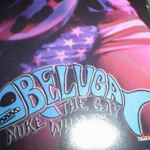 Beluga
BelugaNuke the Gay Whales (CM) An interesting amalgam of heavy blues and punk, with plenty of other touches thrown in. The production is a little weak, leaving the edges rather fuzzy and undefined. Sometimes Beluga pulls a gem, like the faux-gospel blues riff "Let's Get High and Read the Bible", the nice boogie of "Blackout Blues" and the bluesy-DK feel of "Cocksucker Pig" (singer Tom Hevey sounds a lot like Jello on this one). But many of the other songs come off forced-sounding and don't leave much of an impression. Too uneven to rate highly, Beluga manages to pull off the improbable often enough to impress me. I would hate to ask the guys to get a little more coherent, but some closer attention to the nuts and bolts of songwriting might pay big dividends. The stuff doesn't need to be toned down, just tuned up.
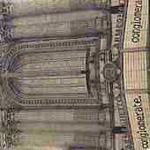 Conglomerate
ConglomerateArmaghetto (Earth Music-Cargo) Wanky hippie soul, if that makes any sense to you. Plenty of references to classic smooth sounds, combined with acoustic guitar riffing, a slightly funky bass and vocals that just scream "seventies!". I know a couple folks who would call this an underproduced Hootie and the Blowhards, and that's probably right, too. The production is a good thing, because if this stuff got punched up too much in the studio, it would come off as pretentious and overwrought. I wouldn't like the album, but it would probably sell a few million copies. Despite the hands-off production, Conglomerate manages to get a bit annoying and excessive. "God bless..." anyone is a bit cliche, and the references to "brother" and "sister" may have been cool when Sly and the Family did it, but this is the 90s, guys. Still, it is an album broaches the gulf between "alternative" and "big star rock". Someone is going to pick these folks up, spend a million in the studio and make a mint, but at least we got to hear a stripped-down album first.
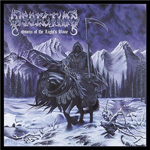 Dissection
DissectionStorm of the Light's Bane (Nuclear Blast) Fans of early At the Gates who were somehow disappointed with Slaughter of the Soul (that group doesn't include me) will definitely groove on this puppy. Plenty of black metal references in basic death-doom constructs. In other words, talented guys throwing in everything but the kitchen sink. But unlike many creative bands, Dissection often limits experimentation to different songs. ATG would often have twenty tempo changes per song (at least, that's what it seemed like). Not here. Dissection taps into serious aggressive instincts and has really crafted some fine stuff. The songwriting is first-rate. A lot of folks just won't believe that hyper-fast death metal can be played in such a way as to sound like a virtuoso performance (a lot of folks run screaming when you mention "death metal", period). Dissection challenges and successfully defeats that notion. The production is great, leaving just the right amount of space between the instruments (the music sounds complete, not cluttered). And the playing and singing are as good as I've heard in the genre. Fans of Amorphis and Gorefest can agree on this one. And anyone who dug Iron Maiden will also find plenty here to like, as well. Give the album a couple songs, get really immersed, and then crank the volume full-blast. Storm of the Light's Bane is a real monster.
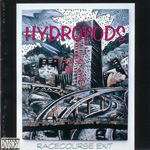 Hydropods
HydropodsRacecourse Exit (CM) Perfectly understated poetry read over pleasantly diverse pop music, albeit with a drum machine. Sounds kinda like the Crispin Glover album. The delivery of the stuff, that is, not the dreadful singing or horrific imagery. A pleasant jaunt into the sunshine. John Dooley wrote (and spoke) the poems and also programmed the drums. This is why the stuff works. The poet knows the right rhythm, and so he determines it. Gary Glover riffed along on various guitars and keyboards. His stuff is a great accompaniment and occasional counterpoint. Deep, this is not. But the sound of a Hydropods piece is positively hypnotic, and the observations in the poetry are deadpan and enlightening. Completely without pretense, Hydropods succeed because sometimes simple life is much more entertaining than stretching and twisting reality. I just want to keep riding along.
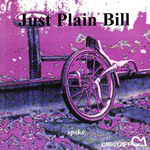 Just Plain Bill
Just Plain BillSpoke (CM) Just yer basic kids wanting to have a little fun playing garage pop music. And when the beat straightens out and picks up, the cruising is fine. Unfortunately, Just Plain Bill wants to do more than play straight 4/4 stuff with no syncopation. Well, the impulse to expand the sound is good, but the band can't pull it off. "Hollywood Cab Ride" is about as good a pop tune as I've heard in a while. And most of the rest of the album is lost in attempts to play funk, reggae (I think; I couldn't really tell) or whip out a ballad or two. All that stuff sounds really tight and uncomfortable. I think the band should continue on this tack, as pure pop bands aren't terribly in demand (what happened to the Posies, after all?) right now. More playing around and such will eventually blend everything Just Plain Bill wants to do into a pop sound much more convincingly. The trick with pop music is to sound at ease, and that's where the band really fails. The only cure is work.
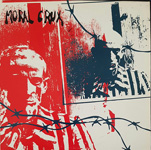 Moral Crux
Moral CruxMoral Crux (CM) The band's first album, recorded in 1987. Back when this sorta pop-punk wasn't terribly in vogue. And, as a bonus, a few tracks from 1991 are added on. Twenty-seven tracks over 50 minutes. Sounds like punk to me. Reasonably tuneful, reasonably aggressive, Moral Crux just doesn't do much to really impress me. The stuff is solid and tight, the lyrics appropriately political and philosophical. All the pieces are here, but the simple fact is that there is no chemistry. All the pluses add up to average. Not terrible, not bad, just average. Undistinguished. Maybe it's the production, though I can't really identify anything that sticks out. Oh well. Time to review the second album (coming up next).
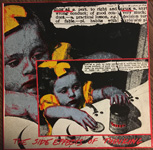 Moral Crux
Moral CruxThe Side Effects of Thinking (CM) This is the second Moral Crux album, recorded in 1989, along with a couple of bonus tracks from the same era. And now I know: it must have been the production, because this album sounds great. There is chemistry here. And the songs are written in a bit more coherent fashion. You can hear a big Bad Religion influence. But that's not what I noticed at first. The production really kicks out the sound, punching up all the parts all the right ways. If you want a primer on the difference a knob twister can make, check out these two Moral Crux albums. The songs fit in the same pegs as the ones from the first album, except that they sound much better here. If you want to hear a good pop-punk band, check out this Moral Crux disc. It does the band justice.
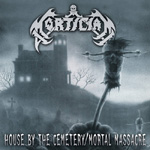 Mortician
MorticianHouse by the Cemetery EP (Relapse Underground) Attempting to merge the heaviness of Godflesh with the utter disregard for enunciation of classic death metal, Mortician has crafted a slimy mess. Is it good? Well, the music is expertly performed, though it does get a bit repetitive. It is, also, as heavy as anything I've heard. And the guys cover Celtic Frost and Napalm Death. Both covers seem a bit cleaner and more techno than the other stuff on the disc, though that is probably by design. One thing this disc shows is Mortician's expertise in the studio. An interesting experiment; one that almost works. I'm not the biggest fan of the "grunting and growling" form of death metal, but I really like the throbbing music included with the silly vocals. And, at times, even the vocals work for me. If you like this sort of thing, I can't imagine why you wouldn't fall in love with Mortician.
Various Artists Swine Before Pearls (CM) The Swine is a band that has a cable access show in Seattle. This compilation features five Swine tracks and 14 tracks from guests on the show. The main connection is humor and politics, and that works pretty well for me. Musically, many of the bands do lean toward the country-rock and folk side of things, but there are exceptions. Beluga (reviewed earlier in this issue) reprises "Let's Get High and Read the Bible", for instance. And get me right: the humor is more often gentle than harsh. A little edgier than Prairie Home Companion, to be sure, but still in that lineage. Focusing just on the lyrics would be a mistake. Vyola Blue turns in a great track called "Paper Airplane", and the Swine are just as accomplished at playing as making folks laugh. As in any compilation, not every song is a winner. But I wish I was in Seattle so that I could see how all this really worked. This album has given me more than I need to be a fan. |
|
return to A&A home page